For those in the know, adding cinnamon to your favorite cup of coffee is a lot better than adding sugar and cream. Not only does our favorite brew taste better, we also get an amazing array of antioxidants and micronutrients for greater health. In fact, studies have shown that cinnamon can actually help us lose wait by minimizing our cravings for sweets, improving our insulin sensitivity, and even soothing our cold symptoms. Given that cinnamon has a lot of health benefits, a number of pet parents are asking if it is also safe to give to dogs. So, should you sprinkle some of that brownish dust over your pooch’s kibble the next time it feeds?

Cinnamon is Safe, But…
Dog experts as well as members of the scientific community say that cinnamon is not toxic to canines. However, it comes with a big but! This has something to do with the amount of spice that is consumed as well as the type of cinnamon that is given to pooches. You see, as it turns out, there are 6 different varieties of Cinnamomum, the scientific name of cinnamon. These include the following.
- cassia – The most common variant of cinnamon, often found in many commercially available products; also known as Chinese cinnamon
- verum – Produced from Sri Lanka and is highly prized for its sweeter, albeit more delicate flavor; it is also known as Ceylon cinnamon
- burmannii – A cinnamon variety from the West Sumatran province of Padang in Indonesia, it is also known as Indonesian cinnamon, Korintje, or Padang cassia
- loureiroi – From Vietnam comes the Vietnamese cassia or Saigon cinnamon
- tamale – This has nothing to do with your favorite Mexican dish called tamale. Cinnamomum tamale is a product of India, hence it is also called the Indian Cinnamon
- citriodorum – This is another species of cinnamon that is endemic to Ceylon or Sri Lanka. However, it is not as famous as its C. verum counterpart
Cinnamomum cassia or simply Chinese cinnamon is a very common spice that you can easily find in your favorite grocery. It’s used in almost any other type of dish that calls for cinnamon. Unfortunately, studies show that it has the highest levels of coumarin, a substance that is known to be a blood-thinning agent. This means that if your pooch gets injured, the risk of bleeding is naturally greater. This is also true with the other sub-varieties of cassia like the C. burmannii and C. loureirei. A much safer alternative is to use the Ceylon cinnamon or its rarer variety the C. citriodorum as this typically has lower levels of coumarin.
The good news is that the blood thinning effects of coumarin can be seen only with the consumption of excessive amounts of these types of cinnamon. Unfortunately, there are no standards as to what levels of Chinese cinnamon can be considered safe for dogs without negatively affecting the thickness of their blood. As such, to be on the safe side, it is always better to provide dogs with only small amounts of Chinese cinnamon, although this is not absolutely necessary or even recommended.
Health Benefits of Cinnamon for Dogs
This sweet spice that is often included in many delectable dishes is no ordinary stick or powder as it comes with manganese, calcium, and iron. This is in addition to its anti-inflammatory and antioxidant effects which can bring a host of benefits for your pooch.
When it comes to bone health we always think of calcium. But manganese can play an important role also as it is needed in the synthesis or production of certain enzymes needed for the building of bone. It also helps in the formation and continuing development of connective tissues while aiding in the proper absorption of calcium in the blood. Together, they can provide for healthier bones.
More importantly, however, is the role that manganese plays in the regulation of glucose in the blood. This makes it particularly beneficial in dogs that are at risk for developing canine diabetes mellitus. Some studies suggest that it can also help control blood sugar spikes in dogs that already have diabetes. At the very least, you can help avoid the release of abnormally high levels of insulin in the blood of your pooch after a meal. Since blood sugar levels do not abruptly increase, the amount of insulin released into the bloodstream is also controlled. This can lead to the minimization of the symptoms and signs associated with diabetes, allowing your diabetic pooch to lead a more functional existence.
Of course, cinnamon’s anti-inflammatory and antioxidant properties can spell improvements in the health of your pet dog. Manganese is known to increase the levels of the enzyme superoxide dismutase which has been noted to be exceptionally low in pooches that have arthritis and other inflammatory problems. As such, adding manganese into the equation brings back the levels of superoxide dismutase and eliminating the problems of arthritis.

Giving Cinnamon to Dogs
It is perfectly alright to give our pooches cinnamon, especially if you prepared it yourself, but only on certain occasions and only in moderate amounts. This is especially true if you have the cassia variety of Cinnamomum. Moreover, smaller breeds of dogs, as well as puppies, are more susceptible to cinnamon overdose which can be manifested by vomiting and diarrhea as well as low blood sugar and changes in the rate and rhythm of the dog’s heart. If your dog is also chewing on cinnamon sticks, there is a chance that this might irritate its mouth. Sniffing on cinnamon powder can also choke your mutt and make it quite difficult to breathe.
That being said, it is always advisable to pay particular attention to how much cinnamon you’re giving. A taste a few times a month should be perfectly fine. But if you intend on giving it as part of its daily diet, then you may need to seek the advice of your veterinarian as your dog may have a condition that won’t really go well with cinnamon.
For healthy dogs, it’s perfectly okay to give them a pinch or two of cinnamon as a luscious treat. Just don’t overdo it.
Sources:
- Vanessa Voltolina, Can Dogs Eat Cinnamon?, PetMD







